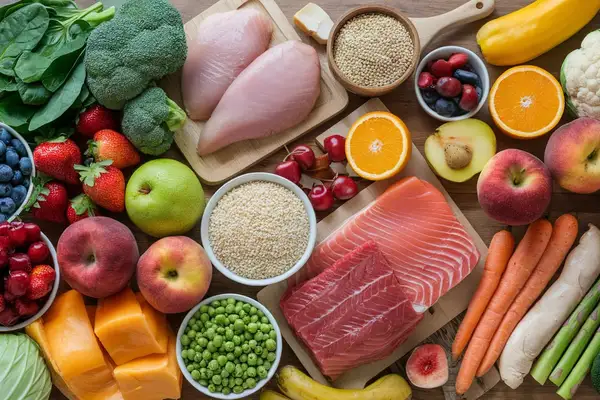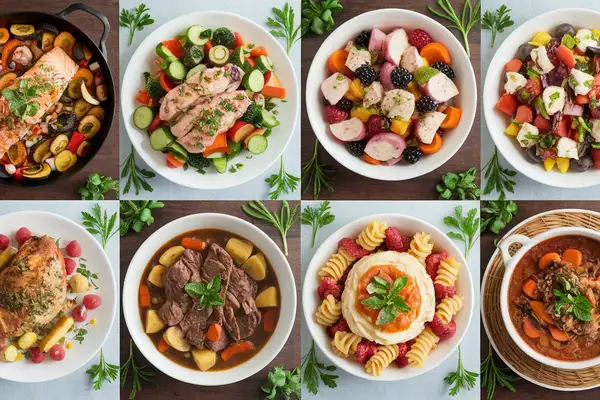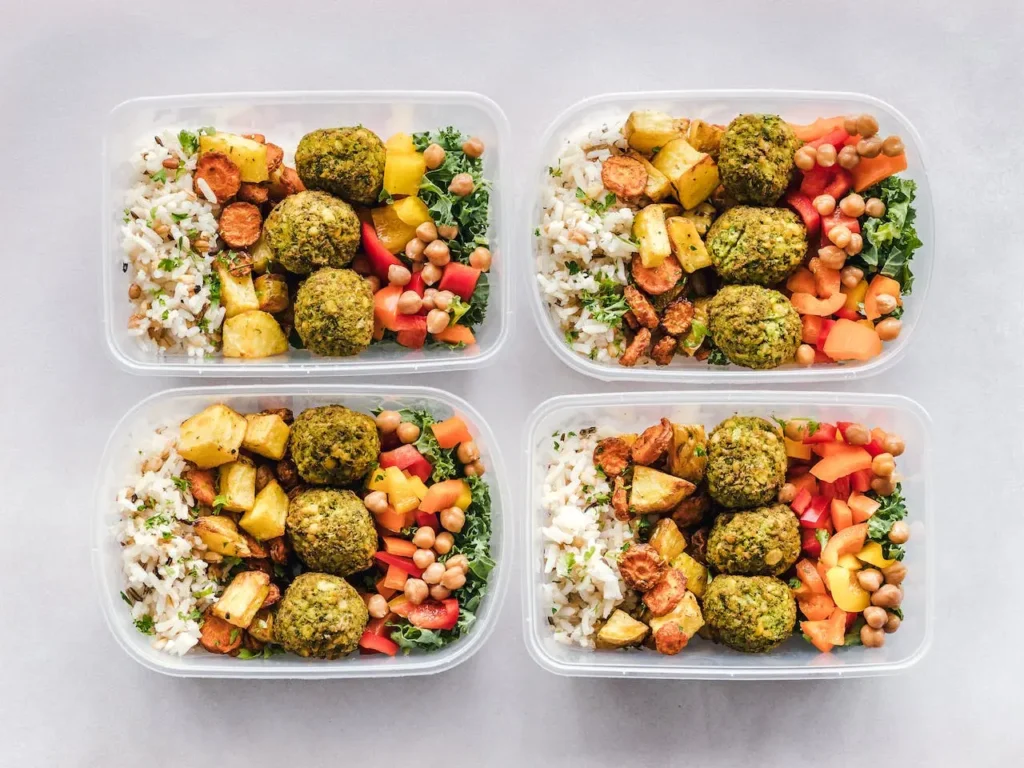Free 7-Day Endomorph Diet Plan For Women
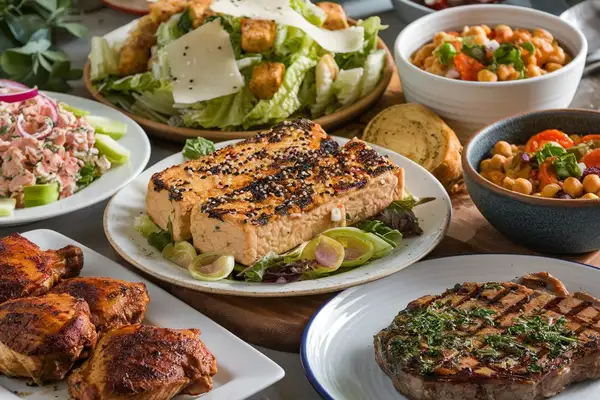
This post may contain affiliate links, meaning I may earn a commission if you make a purchase, at no extra cost to you. I only recommend products I trust. Thank you for your support.
If you’ve ever felt like your body holds onto weight no matter what you do, you might be an endomorph.
Don’t worry, though, with the right approach to nutrition and exercise, you can achieve your health and fitness goals.
In this comprehensive guide, we’ll dive into the world of endomorph diets and provide you with a practical 7-day endomorph diet plan female to kickstart your journey.
What is an Endomorph Diet?
An endomorph diet is a nutrition plan tailored specifically for people with an endomorphic body type.
Endomorphs typically have a larger bone structure, higher body fat percentage, and a slower metabolism compared to other body types.
The goal of an endomorph diet is to optimize nutrition to support weight loss, improve insulin sensitivity, and maintain muscle mass.
The key principles of an endomorph diet include:
- Moderate to low carbohydrate intake
- Higher protein consumption
- Healthy fats in moderation
- Emphasis on whole, unprocessed foods
- Portion control
Understanding the Endomorph Body Type
Before we dive into the diet plan, it’s essential to understand what it means to be an endomorph. Endomorphs tend to:
- Gain weight easily and have difficulty losing it
- Have a “pear-shaped” body with more weight in the lower body
- Possess a slower metabolism
- Be more sensitive to carbohydrates
- Have a natural tendency towards insulin resistance
Knowing these characteristics helps in creating an diet plan that addresses the unique challenges faced by endomorphs.
7-Day Endomorph Diet Plan (V Shred Endomorph Diet Menu)
This endomorph diet plan female is meticulously crafted to support weight management and optimize metabolic function.
Tailored to address the unique needs of the endomorph body type, this endomorphs diet plan emphasizes a balanced intake of lean proteins, healthy fats, and complex carbohydrates.

Day 1
Breakfast:
- Greek Yogurt Parfait: Layer Greek yogurt with mixed berries and a sprinkle of almonds. (1 cup Greek yogurt, 1/2 cup mixed berries, 2 tbsp almonds)
Lunch:
- Grilled Chicken Breast: Served with quinoa and roasted vegetables. (4 oz chicken breast, 1/2 cup cooked quinoa, 1 cup roasted vegetables)
Dinner:
- Baked Salmon: Accompanied by sweet potato and steamed broccoli. (4 oz salmon, 1 medium sweet potato, 1 cup steamed broccoli)
Snacks:
- Carrot Sticks with Hummus: Dip carrot sticks in hummus. (1 cup carrot sticks, 1/4 cup hummus)
- Hard-Boiled Egg with Sliced Cucumber: Enjoy a hard-boiled egg with sliced cucumber. (1 egg, 1/2 cup sliced cucumber)
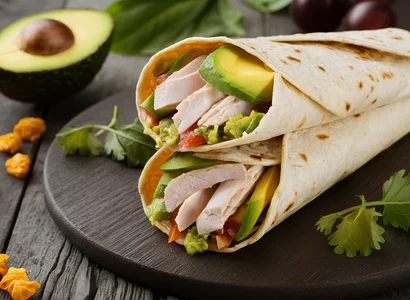
Day 2
Breakfast:
- Spinach and Mushroom Omelet: Served with whole-grain toast. (2 eggs, 1/2 cup spinach, 1/4 cup mushrooms, 1 slice whole-grain toast)
Lunch:
- Turkey and Avocado Lettuce Wraps: With a side salad. (4 oz turkey, 1/2 avocado, 4 lettuce leaves, 1 cup side salad)
Dinner:
- Lean Beef Stir-Fry: Made with mixed vegetables and served with brown rice. (4 oz lean beef, 1 cup mixed vegetables, 1/2 cup cooked brown rice)
Snacks:
- Apple Slices with Almond Butter: Dip apple slices in almond butter. (1 apple, 2 tbsp almond butter)
- Greek Yogurt with Mixed Nuts: Enjoy Greek yogurt with a handful of mixed nuts. (1 cup Greek yogurt, 1/4 cup mixed nuts)
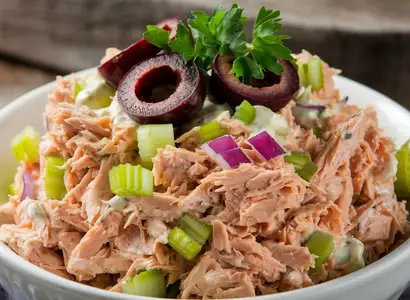
Day 3
Breakfast:
- Protein Smoothie: Blend spinach, banana, protein powder, and almond milk. (1 cup spinach, 1 banana, 1 scoop protein powder, 1 cup almond milk)
Lunch:
- Tuna Salad: Made with Greek yogurt, served on a bed of mixed greens. (1 can tuna, 1/4 cup Greek yogurt, 2 cups mixed greens)
Dinner:
- Grilled Tofu: Served with roasted Brussels sprouts and quinoa. (4 oz tofu, 1 cup roasted Brussels sprouts, 1/2 cup cooked quinoa)
Snacks:
- Celery Sticks with Peanut Butter: Dip celery sticks in peanut butter. (1 cup celery sticks, 2 tbsp peanut butter)
- Small Handful of Pistachios: Enjoy a small handful of pistachios. (1/4 cup pistachios)
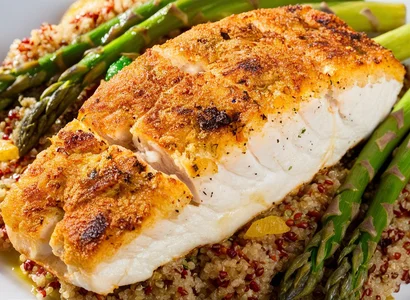
Day 4
Breakfast:
- Overnight Oats: With chia seeds and sliced peaches. (1/2 cup oats, 1 tbsp chia seeds, 1/2 cup sliced peaches)
Lunch:
- Grilled Chicken Caesar Salad: With light dressing. (4 oz grilled chicken, 2 cups mixed greens, 2 tbsp light Caesar dressing)
Dinner:
- Baked Cod: With lemon, asparagus, and cauliflower rice. (4 oz cod, 1/2 lemon, 1 cup asparagus, 1/2 cup of quinoa)
Snacks:
- Cherry Tomatoes and Mozzarella Cheese Cubes: Enjoy cherry tomatoes with mozzarella cheese cubes. (1 cup cherry tomatoes, 1 oz mozzarella cheese)
- Protein Shake: A serving of protein shake. (1 serving protein powder mixed with water or almond milk)
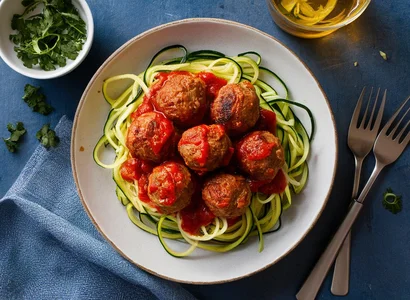
Day 5
Breakfast:
- Scrambled Eggs: With spinach and feta cheese. (2 eggs, 1/2 cup spinach, 1 oz feta cheese)
Lunch:
- Lentil Soup: Served with a side of mixed greens. (1 cup lentil soup, 1 cup mixed greens)
Dinner:
- Turkey Meatballs: With zucchini noodles and marinara sauce. (4 oz turkey meatballs, 1 cup zucchini noodles, 1/2 cup marinara sauce)
Snacks:
- Sliced Bell Peppers with Guacamole: Enjoy bell peppers with guacamole. (1 cup sliced bell peppers, 1/4 cup guacamole)
- Cottage Cheese with Pineapple Chunks: Enjoy cottage cheese with pineapple. (1/2 cup cottage cheese, 1/2 cup pineapple chunks)

Day 6
Breakfast:
- Whole-Grain Toast: With mashed avocado and poached eggs. (1 slice whole-grain toast, 1/2 avocado, 2 poached eggs)
Lunch:
- Grilled Shrimp Skewers: With quinoa and vegetable salad. (4 oz grilled shrimp, 1/2 cup cooked quinoa, 1 cup vegetable salad)
Dinner:
- Baked Chicken Thighs: With roasted sweet potato and green beans. (4 oz chicken thighs, 1 medium sweet potato, 1 cup green beans)
Snacks:
- Homemade Trail Mix: Nuts, seeds, and a few dark chocolate chips. (1/4 cup mixed nuts, 1 tbsp seeds, 1 tbsp dark chocolate chips)
- Sliced Pear with Cheese: Enjoy a sliced pear with a small piece of cheese. (1 pear, 1 oz cheese)

Day 7
Breakfast:
- Greek Yogurt Bowl: With granola and mixed berries. (1 cup Greek yogurt, 1/4 cup granola, 1/2 cup mixed berries)
Lunch:
- Chickpea and Vegetable Curry: Served with brown rice. (1 cup chickpea and vegetable curry, 1/2 cup brown rice)
Dinner:
- Grilled Lean Steak: With roasted vegetables and chimichurri sauce. (4 oz lean steak, 1 cup asparagus)
Snacks:
- Edamame Pods: A serving of edamame pods. (1 cup edamame pods)
- Rice Cake with Almond Butter and Banana Slices: Top a rice cake with almond butter and banana slices. (1 rice cake, 2 tbsp almond butter, 1/2 banana sliced)
Foods Good for Endomorphs
If you’re an endomorph, choosing the right foods can make a big difference in managing your weight and optimizing your health.
When following an endomorph diet plan, focus on incorporating these nutrient-dense foods:
Lean Proteins
- Chicken Breast: A high-protein, low-fat option that helps build muscle and keep you full.
- Turkey: Similar to chicken, it’s low in fat and high in protein, making it a great choice for muscle maintenance.
- Fish: Salmon, tuna, and cod are excellent choices. They provide protein and healthy omega-3 fatty acids that support overall health.
- Tofu: A plant-based protein that’s versatile and can help with muscle repair and growth.
Healthy Fats
- Avocado: Packed with monounsaturated fats, avocado helps with satiety and provides essential nutrients.
- Nuts: Almonds, walnuts, and pistachios are good sources of healthy fats and can help curb hunger.
- Seeds: Chia seeds, flaxseeds, and hemp seeds are rich in omega-3 fatty acids and fiber, which are beneficial for heart health and digestion.
- Olive Oil: A great source of monounsaturated fats that can be used in cooking or as a salad dressing.
Complex Carbohydrates
- Quinoa: A high-protein whole grain that’s also rich in fiber, helping to keep you full and stabilize blood sugar levels.
- Brown Rice: Provides long-lasting energy and is less likely to cause spikes in blood sugar compared to white rice.
- Oats: A good source of soluble fiber that aids in digestion and helps maintain stable blood sugar levels.
- Sweet Potatoes: Rich in vitamins and fiber, they provide a slow-releasing source of carbohydrates that supports energy levels.
Fruits and Vegetables
- Berries: Blueberries, strawberries, and raspberries are low in sugar and high in antioxidants, making them a great choice for a sweet treat without the extra calories.
- Leafy Greens: Spinach, kale, and Swiss chard are nutrient-dense and low in calories, helping to fill you up without adding extra fat.
- Cruciferous Vegetables: Broccoli, cauliflower, and Brussels sprouts are high in fiber and can aid in digestion while supporting weight loss.
- Bell Peppers: High in vitamins A and C, bell peppers add flavor and nutrients to your meals with minimal calories.
Legumes
- Chickpeas: High in protein and fiber, chickpeas can be used in salads, soups, and stews.
- Lentils: A great source of plant-based protein and fiber, lentils help keep you full and satisfied.
- Black Beans: Rich in protein and fiber, black beans support digestion and provide a steady source of energy.
Dairy Alternatives
- Greek Yogurt: High in protein and probiotics, Greek yogurt aids in digestion and helps keep you full.
- Cottage Cheese: A low-fat, high-protein option that’s perfect for snacks or meals.
- Almond Milk: A lower-calorie alternative to cow’s milk, great for those who are lactose intolerant or looking to reduce calorie intake.
Foods to Avoid on an Endomorph Diet
Since endomorphs often have a slower metabolism and a tendency to store body fat more easily, it’s important to avoid foods that can exacerbate these issues:
Refined Carbohydrates
- White Bread: Made from refined flour, it can cause spikes in blood sugar and lead to weight gain.
- Pastries and Croissants: These are often high in sugar and unhealthy fats, which can contribute to fat accumulation.
- Sugary Cereals: Typically high in sugar and low in fiber, these can cause rapid increases in blood sugar levels.
Fried Foods
- French Fries: Deep-fried and high in unhealthy trans fats, they can contribute to weight gain and poor cardiovascular health.
- Fried Chicken: Coated in batter and fried in oil, this food is high in calories and unhealthy fats.
- Doughnuts: Fried and filled with sugar, they offer little nutritional value and are high in empty calories.
Sugary Beverages
- Soda: Loaded with sugar and empty calories, soda can lead to weight gain and increased risk of diabetes.
- Energy Drinks: Often high in sugar and caffeine, these can cause energy crashes and contribute to weight gain.
- Sweetened Coffee Drinks: Beverages like lattes and frappuccinos can be packed with sugar and calories.
High-Sugar Foods
- Candy and Chocolate: High in sugar and fat, these can lead to weight gain and negatively affect blood sugar levels.
- Ice Cream: Often high in sugar and fat, it can contribute to excess calorie intake and weight gain.
- Cookies and Cakes: Typically made with refined sugars and fats, they offer little nutritional benefit and can lead to weight gain.
Highly Processed Foods
- Packaged Snacks: Chips, crackers, and other processed snacks often contain unhealthy fats, sugars, and high sodium levels.
- Processed Meats: Items like hot dogs, sausages, and deli meats can be high in sodium, preservatives, and unhealthy fats.
- Instant Noodles: Often high in sodium and unhealthy fats, they can contribute to weight gain and poor health.
High-Sodium Foods
- Canned Soups: These can be high in sodium, which can lead to water retention and bloating.
- Salty Snacks: Items like pretzels and salted nuts can increase sodium intake and contribute to bloating.
- Soy Sauce: Contains high levels of sodium, which can contribute to water retention and high blood pressure.
Alcohol
- Beer: High in empty calories and carbohydrates, beer can contribute to weight gain and disrupt metabolism.
- Sweet Cocktails: Often mixed with sugary syrups and juices, they can be high in calories and sugar.
- Liquor: While lower in sugar, it can still add significant calories to your diet and affect your metabolism.
Benefits of an Endomorph Diet
- Reduced Fat Accumulation: By focusing on a diet higher in proteins and healthy fats while controlling carbohydrate intake, endomorphs can better manage their tendency to store fat, particularly around the midsection.
- Balanced Blood Sugar Levels: Limiting refined carbs and sugars helps stabilize blood sugar, reducing insulin spikes and the likelihood of fat storage.
- Boosted Metabolism: The endomorph diet incorporates lean proteins and strength training which helps build muscle mass, which in turn increases metabolic rate and burns more calories at rest.
- Steady Energy Release: By focusing on complex carbohydrates and balanced meals, energy levels remain stable throughout the day, preventing the energy crashes often associated with high-sugar diets.
- Lean Muscle Preservation: A higher protein intake supports muscle repair and growth, which is crucial for endomorphs who engage in regular strength training.
Endomorph Diet Tips
To manage weight and optimize health, here are some diet tips tailored for endomorphs:
- Focus on Lean Proteins: Include chicken, turkey, fish, eggs, and plant-based proteins. Protein helps with satiety and muscle maintenance.
- Choose High-Fiber Foods: Incorporate plenty of vegetables, fruits, and whole grains to keep you full longer and improve digestion.
- Practice Portion Control: This naturally limits the amount of food you serve yourself, reducing the likelihood of overeating.
- Meal Frequency: Eating 4-5 smaller meals throughout the day can help manage hunger and prevent overeating.
- Carb Timing: Consider consuming most of your carbs earlier in the day or around workout times to support energy needs and recovery.
- Consider Intermittent Fasting: Some endomorphs benefit from fasting protocols, like 16:8, where you fast for 16 hours and eat during an 8-hour window.
- Keep Hydrated: Drink plenty of water throughout the day to support metabolism and reduce water retention.
- Have Early Dinners: Try to have your last meal at least 2-3 hours before bedtime.
Conclusion
The endomorph diet plan is all about finding the right balance of nutrients to support your body type.
By focusing on lean proteins, complex carbohydrates, and healthy fats, while controlling portions and staying active, you can achieve your health and fitness goals.
Remember, consistency is key. Stick with this endomorph diet plan, make adjustments as needed, and be patient with your progress. You’ve got this!
Now, armed with this 7-day endomorph diet plan and all the information you need, you’re ready to start your journey towards a healthier, fitter you.
Good luck!
- 7-day metabolic confusion diet
- 7 day clean eating meal plan
- 3 day military diet
- 7-day alkaline diet for beginners
- 7-day anti-candida diet plan
- Healthy real food recipes
- Low glycemic index foods list
- Food to eat while taking Mounjaro
- BRAT diet foods for upset stomach
- 1200 calorie deficit meal plan
- DASH diet meal plan
- 19+ Blue zone recipes
FAQs
Can endomorphs eat eggs?
Yes, eggs are an excellent source of protein and healthy fats for endomorphs. They can be included as part of a balanced endomorph diet plan.
What are the three fat destroyers for endomorphs?
The three key fat destroyers for endomorphs are:
1) High-intensity interval training (HIIT).
2) Strength training.
3) A balanced diet focusing on lean proteins, complex carbs, and healthy fats.
Is a keto diet good for endomorphs?
While a keto diet can be effective for some endomorphs, a more balanced approach with moderate carbs is often more sustainable long-term.
Are oats good for endomorphs?
Yes, oats can be a good choice for endomorphs as they are a complex carbohydrate that provides sustained energy and helps with satiety. However, portion control is key.
What meats are good for endomorphs?
Lean meats such as chicken breast, turkey, lean beef, and fish are excellent protein sources for endomorphs. They provide essential nutrients without excess fat.
Can endomorphs get a flat stomach?
Yes, endomorphs can achieve a flat stomach through a combination of proper diet, regular exercise (including strength training and cardio), and consistency. It may take more time and effort compared to other body types.
Can endomorphs have bread?
Endomorphs can include bread in their diet, but it’s best to choose whole grain options and consume in moderation
